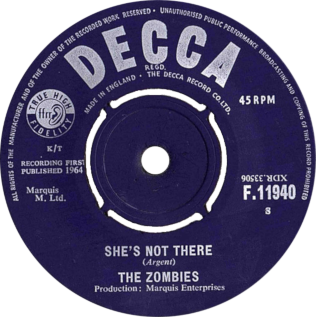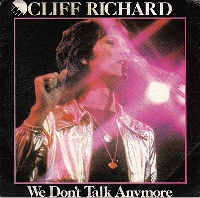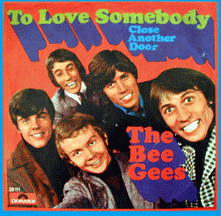Related Research Articles

"Classical Gas" is an instrumental musical piece composed and originally performed by American guitarist Mason Williams with instrumental backing by members of the Wrecking Crew. Originally released in 1968 on the album The Mason Williams Phonograph Record, it has been rerecorded and rereleased numerous times since by Williams. One later version served as the title track of a 1987 album by Williams and the band Mannheim Steamroller.

"I'm a Believer" is a song written by Neil Diamond and recorded by the American band the Monkees in 1966 with the lead vocals by Micky Dolenz. The single, produced by Jeff Barry, hit the number-one spot on the U.S. Billboard Hot 100 chart for the week ending December 31, 1966, and remained there for seven weeks becoming the last number-one hit of 1966 and the biggest-selling single for all of 1967. Billboard ranked the record as the number-five song for 1967. While originally published by Screen Gems-Columbia Music (BMI), it is now published by Stonebridge Music/EMI Foray Music (SESAC), with administration passed to Sony Music Publishing and Universal Music Publishing Group.
"Mamma" is a popular song composed in 1940 by Cesare Andrea Bixio with Italian lyrics by Bixio Cherubini under the title "Mamma son tanto felice".
John Barry Mason was an English singer and songwriter. A leading songwriter of the 1960s, he wrote the bulk of his most successful songs in partnership with Les Reed. Mason gained many gold and platinum awards for his work including five Ivor Novello Awards, the most recent of them in 1998.

"Eloise" is a song first released in 1968 on the MGM label. It was sung by Barry Ryan, and written by his twin brother Paul Ryan. Running for over five minutes, it features strong orchestration, melodramatic vocals, and a brief slow interlude. It sold three million copies worldwide, and reached No. 2 in the UK Singles Chart as published by Record Retailer, but hit No. 1 in the NME and Melody Maker charts. It topped the chart in 17 countries, including Italy, the Netherlands and Australia.

"She's Not There" is the debut single by the English rock band the Zombies, written by keyboardist Rod Argent. It reached No. 12 in the UK Singles Chart in September 1964, and No. 2 on the Billboard Hot 100 in the United States at the beginning of December 1964. In Canada, it reached No. 2.
Leslie David Reed was an English songwriter, arranger, musician and light-orchestra leader. His major songwriting partners were Gordon Mills, Barry Mason, and Geoff Stephens, although he wrote songs with many others such as Roger Greenaway, Roger Cook, Peter Callander, and Johnny Worth.

"We Don't Talk Anymore" is a song recorded by Cliff Richard, written by Alan Tarney and produced by the Shadows' rhythm guitarist, Bruce Welch. It was released in 1979 as a single and reached number one in the UK Singles Chart in August 1979, remaining there for four weeks, Richard's tenth UK number one and his first since "Congratulations" in 1968.

"Yummy Yummy Yummy" is a song by Arthur Resnick and Joey Levine, first recorded by Ohio Express in 1968. Their version reached No. 4 on the U.S. Pop Singles chart in June and No. 5 on the UK Singles Chart. It has since been covered by many artists. Ohio Express was a studio concoction and none of the "official" members appear on the record. Joey Levine sang lead vocals.

"Mony Mony" is a 1968 single by American pop rock band Tommy James and the Shondells, which reached No. 1 on the UK Singles Chart and No. 3 in the U.S. Written by Bobby Bloom, Ritchie Cordell, Bo Gentry, and Tommy James, the song has appeared in various film and television works such as the Oliver Stone drama Heaven & Earth. It was also covered by English singer-songwriter Billy Idol in 1981. Idol's version, which took in more of a rock sound, became an international top 40 hit and additionally revived public interest in the original garage rock single. Idol recorded a live version in 1985 which was ultimately released in 1987 where it became an even bigger hit than the Shondells' 1968 original, reaching No. 1 on the Billboard Hot 100.

"To Love Somebody" is a song written by Barry and Robin Gibb. Produced by Robert Stigwood, it was the second single released by the Bee Gees from their international debut album, Bee Gees 1st, in 1967. The single reached No. 17 in the United States and No. 41 in the United Kingdom. The song's B-side was "Close Another Door". The single was reissued in 1980 on RSO Records with "How Can You Mend a Broken Heart" as its flipside. The song ranked at number 94 on NME magazine's "100 Best Tracks of the Sixties". The entry was a minor hit in France but reached the top 10 in Canada.

"The Last Waltz" is a ballad, written by Barry Mason and Les Reed. It was one of Engelbert Humperdinck's biggest hits, spending five weeks at number 1 on the UK Singles Chart, from September 1967 to October 1967, and has since sold over 1.17 million copies in the United Kingdom.
"Release Me" is a popular song written by Eddie Miller and Robert Yount in 1949. Four years later it was recorded by Jimmy Heap & the Melody Masters, and with even better success by Patti Page (1954), Ray Price (1954), and Kitty Wells (1954). Jivin' Gene [Bourgeois] & the Jokers recorded the tune in 1960, and that version served as an inspiration for Little Esther Phillips, who reached number one on the R&B chart and number eight on the pop chart with her big-selling cover. The Everly Brothers followed in 1963, along with Lucille Starr including a translation in French (1964), Jerry Wallace (1966), Dean Martin (1967), and Engelbert Humperdinck (1967), whose version reached number one on the UK Singles Chart.
"Paper Plane" is a rock song originally by Status Quo. It was released as a single on 10 November 1972, reaching number 8 in the UK Singles Chart, and appeared on their album, Piledriver. The song was written by Francis Rossi and Bob Young.

"Tears" is a song written by lyricist Frank Capano and composer Billy Uhr, which was popularised by Rudy Vallée in 1930. It was later made famous in a version recorded by Ken Dodd, released as a 45 rpm single in 1965, which became a bestselling No. 1 hit in the UK Singles Chart.

"Kiss Me Goodbye" is a Les Reed/ Barry Mason composition recorded in 1968 by Petula Clark.

"We'll Bring the House Down" is a song by the British rock band Slade, released in 1981 as the lead single from their ninth studio album We'll Bring the House Down. It was written by lead vocalist Noddy Holder and bassist Jim Lea, and produced by Slade. The band's first single to reach the UK Top 40 since 1977, the song peaked at No. 10 in the UK, remaining in the chart for nine weeks.
"Simon Says" is a bubblegum pop song written by Elliot Chiprut and originally recorded in 1967 by the 1910 Fruitgum Company, becoming their most successful chart hit.
"International Bright Young Thing" is a song by British alternative dance band Jesus Jones. It was released as the third single from their second album, Doubt. The song was included on Jesus Jones's compilation album Never Enough: The Best of Jesus Jones, released in 2002.

"I Didn't Know I Loved You (Till I Saw You Rock and Roll)" is a song by English glam rock singer Gary Glitter, written by Glitter with Mike Leander and produced by Mike Leander. It was released as the second single from his debut studio album, Glitter (1972) and peaked at No. 4 on the UK Singles Chart. It was also Glitter's second and last charted record in the US, peaking at #35. Rock Goddess and Planet Patrol both recorded cover versions in 1983.
References
- 1 2 3 "Des O'Connor - I Pretend (Vinyl) at Discogs". Discogs.com. 1968. Retrieved 2014-03-26.
- ↑ Stanley, Bob (13 September 2013). "1991: Time for the Mu Mu". Yeah Yeah Yeah: The Story of Modern Pop. Faber & Faber. p. 639. ISBN 978-0-571-28198-5.
- ↑ "ACE Title Search". Archived from the original on 2009-03-19. Retrieved 2009-03-18.
- ↑ Roberts, David (2006). British Hit Singles & Albums (19th ed.). London: Guinness World Records Limited. p. 221. ISBN 1-904994-10-5.
- 1 2 "The Irish Charts – Search Results – I Pretend". Irish Singles Chart.
- ↑ Kutner, Jon; Leigh, Spencer (2010). 1,000 UK Number One Hits. Omnibus Press. ISBN 9780857123602 – via Google Books.
- 1 2 "Des O'Connor: Artist Chart History". Official Charts Company.
- ↑ Whitburn, Joel (2002). Top Adult Contemporary: 1961-2001. Record Research. p. 49.